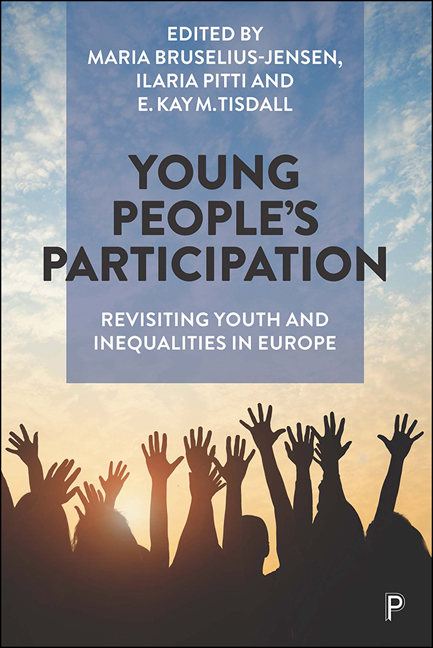Book contents
- Frontmatter
- Contents
- List of figures and tables
- Notes on contributors
- Acknowledgements
- 1 Revisiting young people's participation: an introduction
- PART I Young people's experiences of participation and engagement
- PART II Current state and conditions for young people’s participation: critiques and trends
- PART III Broadening participation: young people's own approaches to participation
- PART IV New opportunities for young people's participation: facilitating new forms of youth participation
- Index
10 - Justifying self-organisation: between inequality and critique
Published online by Cambridge University Press: 18 December 2021
- Frontmatter
- Contents
- List of figures and tables
- Notes on contributors
- Acknowledgements
- 1 Revisiting young people's participation: an introduction
- PART I Young people's experiences of participation and engagement
- PART II Current state and conditions for young people’s participation: critiques and trends
- PART III Broadening participation: young people's own approaches to participation
- PART IV New opportunities for young people's participation: facilitating new forms of youth participation
- Index
Summary
Based on ethnographic fieldwork and the concepts of self-organisation and semi-organisation, this chapter analyses how young people from Denmark organise themselves within their leisure time. The chapter focuses on how young people design participatory possibilities for other young people mainly by themselves, but also through dialogue and collaboration with municipalities, associations and external entities. The chapter draws on Boltanski and Thévenot's (2006) pragmatic sociology and illustrates how temporal and spatial logics influence youth participatory processes. The notion of justification makes it possible to analyse participatory processes that are often taken for granted when it comes to designing participatory spaces for young people in Scandinavia. The phrase ‘between inequality and critique’ in the chapter title denotes an intersection between how institutional logics, on the one hand, construct unequal opportunities for young people and, on the other hand, motivate a critical thinking towards existing participatory possibilities that foster processes of empowerment that would not emerge otherwise.
Key findings
• Time and space in young people's everyday lives are hidden structures that can construct inequalities in terms of how and which participatory processes are legitimised.
• The chapter provides critical reflections about the ways in which institutions construct time and space for young people's participation and why time and space are relevant to understanding youth and complex processes of inequality.
• Adult-led participatory approaches tend to neglect young people's perspectives and ways to design participatory spaces, which consequently can result in young people losing their motivation to participate. The chapter elucidates how young people participate through self-organised and semi-organised practices that are not adult-led.
• Young people who try to organise themselves need to justify their participatory approaches, but might be marginalised because institutionalised participatory spaces are favoured across Europe.
Introduction
‘The biggest challenge with grassroots work is that, even if you don't want to, you become more organised. You need to organise it to a small extent, even if you want to be self-organised, but as soon as you do so, you run into an established culture … where you have to compromise your own values.’ (Interview, 2015)
This quote is from an interview with a Danish man who for several years has tried to construct alternatively organised participatory possibilities for young people and adults interested in alternative cultures of movement.
- Type
- Chapter
- Information
- Young People's ParticipationRevisiting Youth and Inequalities in Europe, pp. 157 - 174Publisher: Bristol University PressPrint publication year: 2021

